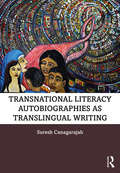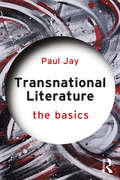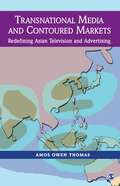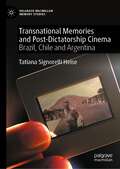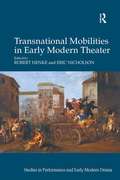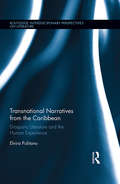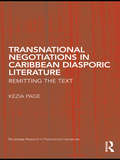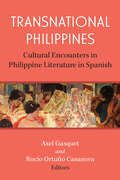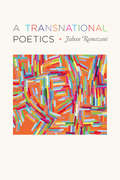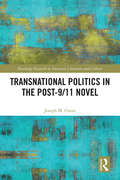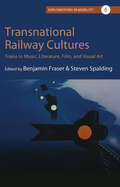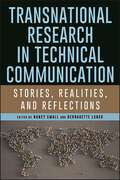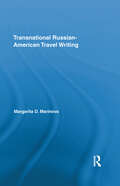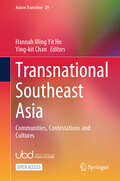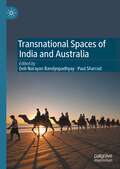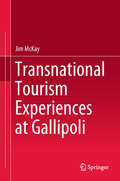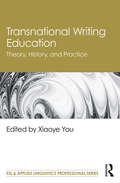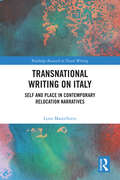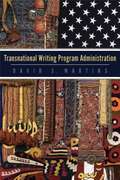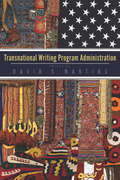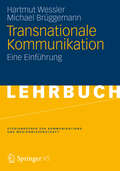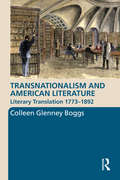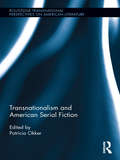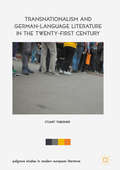- Table View
- List View
Transnational Literacy Autobiographies as Translingual Writing
by Suresh CanagarajahThe literacy autobiography is a personal narrative reflecting on how one’s experiences of spoken and written words have contributed to their ongoing relationship with language and literacy. Transnational Literacy Autobiographies as Translingual Writing is a cutting-edge study of this engaging genre of writing in academic and professional contexts. In this state-of-the-art collection, Suresh Canagarajah brings together 11 samples of writing by students that both document their literary journeys and pinpoint the seminal works affecting their development as translingual readers and writers. Integrating the narrative of the author, which is written as his own literacy autobiography, with a close analysis of these texts, this book: presents a case for the literacy autobiography as an archetypal genre that prepares writers for the conventions and processes required in other genres of writing; demonstrates the serious epistemological and rhetorical implications behind the genre of literacy autobiography among migrant scholars and students; effectively translates theoretical publications on language diversity for classroom purposes, providing a transferable teaching approach to translingual writing; analyzes the tropes of transnational writers and their craft in "meshing" translingual resources in their writing; demonstrates how transnationalism and translingualism are interconnected, guiding readers toward an understanding of codemeshing not as a cosmetic addition to texts but motivated toward resolving inescapable personal and social dilemmas. Written and edited by one of the most highly regarded linguists of his generation, this book is key reading for scholars and students of applied linguistics, TESOL, and literacy studies, as well as tutors of writing and composition worldwide.
Transnational Literature: The Basics (The Basics)
by Paul JayTransnational Literature: The Basics provides an indispensable overview of this important new field of study and the literature it explores. It concisely describes the various ways in which literature can be understood as being "transnational," explains why scholars in literary studies have become so interested in the topic, and discusses the economic, political, social, and cultural forces that have shaped its development. The book explores a range of contemporary critical approaches to the subject, highlighting how topics like globalization, cosmopolitanism, diaspora, history, identity, migration, and decolonization are treated by both scholars in the field and the writers they study. The literary works discussed range across the globe and include fiction, poetry, and drama by writers including Jhumpa Lahiri, Chimamanda Ngozi Adichie, Jenny Erpenbeck, Aleksandar Hemon, Viet Thanh Nguyen, Derek Walcott, Louise Bennett, Xiaolu Guo, Sally Wen Mao, Wole Soyinka, and many more. This survey stresses the range and breadth—but also the intersecting interests—of transnational writing, engaging the variety of subjects it covers and emphasizing the range of literary devices (linguistic, formal, narrative, poetic, and dramatic) it employs. Highlighting the subjects and issues that have become central to fiction in the age of globalization, Transnational Literature: The Basics is an essential read for anyone approaching study of this vibrant area.
Transnational Media and Contoured Markets: Redefining Asian Television and Advertising
by Amos Owen ThomasIn a world increasingly polarising into media-rich and media-poor nations, the rapid spread of satellite and cable television has triggered a vigorous debate on the globalisation of media and markets. At the beginning of the twenty-first century, media and communications technologies have been converging at an unprecendented pace worldwide. Transnational Media and Contoured Markets brings a multi-faceted perspective to bear on the transformation of the broadcast and advertising industries in Asia at the turn of the century. Drawing on case studies of satellite and cable channels across South, Southeast and Northeast Asia, the author argues that the globalisation of the media and advertising can only be understood within the broader context of economic, political, social and cultural processes within nation states, subnational regions and transborder ethnic communities. Additionally, this book raises the deeper socio-ethical issues of relentless globalisation for developing countries and transnational economies worldwide.
Transnational Memories and Post-Dicatorship Cinema: Brazil, Chile and Argentina (Palgrave Macmillan Memory Studies)
by Tatiana Signorelli HeiseThis book investigates the role that cinemas in Brazil, Chile and Argentina have played in reconstructing memories of the most recent military dictatorships. These countries have undergone a distinctive post-dictatorship experience marked by unprecedented debates about human rights violations, the silencing of victims and accountability for state crimes. Meanwhile, politically committed filmmakers have created an extensive body of work addressing the dictatorship and its aftermath. This book employs a transnational and comparative approach to examine the strategies that these filmmakers have used to render visible what has remained hidden, to make reappear what has disappeared, and to reinterpret historical actors and events from a contemporary perspective. Through attention to the specific properties of the medium and the socio-historical context in which films have been made, it describes the different cinematic modes of remembering that emerged in response to wider memory frameworks in South America.
Transnational Mobilities in Early Modern Theater (Studies in Performance and Early Modern Drama)
by Robert Henke Eric NicholsonThe essays in this volume investigate English, Italian, Spanish, German, Czech, and Bengali early modern theater, placing Shakespeare and his contemporaries in the theatrical contexts of western and central Europe, as well as the Indian sub-continent. Contributors explore the mobility of theatrical units, genres, performance practices, visual images, and dramatic texts across geo-linguistic borders in early modern Europe. Combining 'distant' and 'close' reading, a systemic and structural approach identifies common theatrical units, or 'theatergrams' as departure points for specifying the particular translations of theatrical cultures across national boundaries. The essays engage both 'dramatic' approaches (e.g., genre, plot, action, and the dramatic text) and 'theatrical' perspectives (e.g., costume, the body and gender of the actor). Following recent work in 'mobility studies,' mobility is examined from both material and symbolic angles, revealing both ample transnational movement and periodic resistance to border-crossing. Four final essays attend to the practical and theoretical dimensions of theatrical translation and adaptation, and contribute to the book’s overall inquiry into the ways in which values, properties, and identities are lost, transformed, or gained in movement across geo-linguistic borders.
Transnational Narratives from the Caribbean: Diasporic Literature and the Human Experience (Routledge Interdisciplinary Perspectives on Literature)
by Elvira PulitanoThis book offers a timely intervention in current debates on diaspora and diasporic identity by affirming the importance of narrative as a discursive mode to understand the human face of contemporary migrations and dislocations. Focusing on the Caribbean double-diaspora, Pulitano offers a close-reading of a range of popular works by four well-known writers currently living in the United States: Jamaica Kincaid, Michelle Cliff, Edwidge Danticat, and Caryl Phillips. Navigating the map of fictional characters, testimonial accounts, and autobiographical experiences, Pulitano draws attention to the lived experience of contemporary diasporic formations. The book offers a provocative re-thinking of socio-scientific analyses of diaspora by discussing the embodied experience of contemporary diasporic communities, drawing on disciplines such as Caribbean, Postcolonial, Diaspora, and Indigenous Studies along with theories on "border thinking" and coloniality/modernity. Contesting restrictive, national, and linguistic boundaries when discussing literature originating from the Caribbean, Pulitano situates the transnational location of Caribbean-born writers within current debates of Transnational American Studies and investigates the role of immigrant writers in discourses of race, ethnicity, citizenship, and belonging. Exploring the multifarious intersections between home, exile, migration and displacement, the book makes a significant contribution to memory and trauma studies, human rights debates, and international law, aiming at a wide range of scholars and specialized agents beyond the strictly literary circle. This volume affirms the humanity of personal stories and experiences against the invisibility of immigrant subjects in most theoretical accounts of diaspora and migration.
Transnational Negotiations in Caribbean Diasporic Literature: Remitting the Text (Routledge Research In Postcolonial Literatures Ser. #29)
by Kezia PageTaking an interdisciplinary approach, Page casts light on the role of citizenship, immigration, and transnational mobility in Caribbean migrant and diaspora fiction. Page's historical, socio-cultural study responds to the general trend in migration discourse that presents the Caribbean experience as unidirectional and uniform across the geographical spaces of home and diaspora. She argues that engaging the Caribbean diaspora and the massive waves of migration from the region that have punctuated its history, involves not only understanding communities in host countries and the conflicted identities of second generation subjectivities, but also interpreting how these communities interrelate with and affect communities at home. In particular, Page examines two socio-economic and political practices, remittance and deportation, exploring how they function as tropes in migrant literature, and as ways of theorizing such literature.
Transnational Perspectives on Artists’ Lives: From The Nineteenth Century To The Present (Palgrave Studies in Life Writing)
by Marleen Rensen Christopher WileyThis book demonstrates the significance of transnationality for studying and writing the lives of artists. While painters, musicians and writers have long been cast as symbols of their associated nations, recent research is increasingly drawing attention to those aspects of their lives and works that resist or challenge the national framework. The volume showcases different ways of treating transnationality in life writing by and about artists, investigating how the transnational can offer intriguing new insights on artists who straddle different nations and cultures. It further explores ways of adopting transnational perspectives in artists’ biographies in order to deal with experiences of cultural otherness or international influences, and analyses cross-cultural representations of artists in biography and biofiction. Gathering together insights from biographers and scholars with expertise in literature, music and the visual arts, Transnational Perspectives on Artists’ Lives opens up rich avenues for researching transnationality in the cultural domain at large.
Transnational Philippines: Cultural Encounters in Philippine Literature in Spanish
by UnknownTransnational Philippines: Cultural Encounters in Philippine Literature in Spanish approaches literature that has been forgotten or neglected in studies on other literatures in Spanish due, in part, to the fact that today Spanish is no longer spoken in the Philippines or in Asia. However, isolation has not always been the case, and by omitting Philippine literature in Spanish from the picture of world literatures and Spanish-language literatures, the landscape of these disciplines is incomplete. Transnational Philippines studies how this literary production stemmed from its relationship with other cultures, literature, and arts. It attempts to break this literature’s isolation and show how it is part of the broad literary system of literature written in Spanish. Yet Transnational Philippines also questions the constraints of traditional literary genres in order to make room for Philippine texts and other colonial and postcolonial texts, so that those texts can be taken into consideration in literary studies. Its chapters elaborate on the problems surrounding the cultural and identity relations of the Philippines with other regions and the literary nature of Philippine texts. By addressing the need for a postnational approach to Spanish-language Philippine literature, the book challenges the Spain/Latin America dichotomy existing in Spanish language literary studies and leans toward a global conception of the Hispanophone.
A Transnational Poetics
by Jahan RamazaniPoetry is often viewed as culturally homogeneous—“stubbornly national,” in T. S. Eliot’s phrase, or “the most provincial of the arts,” according to W. H. Auden. But in A Transnational Poetics, Jahan Ramazani uncovers the ocean-straddling energies of the poetic imagination—in modernism and the Harlem Renaissance; in post–World War II North America and the North Atlantic; and in ethnic American, postcolonial, and black British writing. Cross-cultural exchange and influence are, he argues, among the chief engines of poetic development in the twentieth and twenty-first centuries. Reexamining the work of a wide array of poets, from Eliot, Yeats, and Langston Hughes to Elizabeth Bishop, Lorna Goodison, and Agha Shahid Ali, Ramazani reveals the many ways in which modern and contemporary poetry in English overflows national borders and exceeds the scope of national literary paradigms. Through a variety of transnational templates—globalization, migration, travel, genre, influence, modernity, decolonization, and diaspora—he discovers poetic connection and dialogue across nations and even hemispheres.
Transnational Politics in the Post-9/11 Novel (Routledge Research in American Literature and Culture)
by Joseph ConteTransnational Politics in the Post-9/11 Novel suggests that literature after September 11, 2001 reflects the shift from bilateral nation-state politics to the multilateralism of transnational politics. While much of the criticism regarding novels of 9/11 tends to approach these works through theories of personal and collective trauma, this book argues for the evolution of a post-9/11 novel that pursues a transversal approach to global conflicts that are unlikely to be resolved without diverse peoples willing to set aside sectarian interests. These novels embrace not only American writers such as Don DeLillo, Dave Eggers, Ken Kalfus, Thomas Pynchon, and Amy Waldman but also the countervailing perspectives of global novelists such as J. M. Coetzee, Orhan Pamuk, Mohsin Hamid, and Laila Halaby. These are not novels about terror(ism), nor do they seek comfort in the respectful cloak of national mourning. Rather, they are instances of the novel in terror, which recognizes that everything having been changed after 9/11, only the formally inventive presentation will suffice to acknowledge the event’s unpresentability and its shock to the political order.
Transnational Railway Cultures: Trains in Music, Literature, Film, and Visual Art (Explorations in Mobility #6)
by Benjamin Fraser Steven SpaldingSince the advent of train travel, railways have compressed space and crossed national boundaries to become transnational icons, evoking hope, dread, progress, or obsolescence in different cultural domains. Spanning five continents and a diverse range of contexts, this collection offers an unprecedentedly broad survey of global representations of trains. From experimental novels to Hollywood blockbusters, the works studied here chart fascinating routes across a remarkably varied cultural landscape.
Transnational Research in Technical Communication: Stories, Realities, and Reflections (SUNY series, Studies in Technical Communication)
by Nancy Small; Bernadette LongoTransnational Research in Technical Communication considers the complexities of intercultural projects from a compelling perspective: first-hand narrative reflections. Readers go behind the scenes as scholars share their experiences crossing a variety of borders in their efforts to engage in knowledge-making endeavors. Interwoven through each chapter are stories of how projects were designed, adapted, and sometimes even failed. The collection begins with an introduction situating it at the intersection of recent scholarship in storywork, intercultural research, and technical and professional communication’s social justice turn. Each chapter concludes with discussion questions and recommendations for further reading. The closing chapter reveals a nascent "ethic of transnational and intercultural research" growing out of contributors' lessons learned and generous reflections. Anyone interested in or planning to undertake a transnational or intercultural project can benefit from these storied case studies, and as a result, this collection contributes to moving the field forward as it strives to promote more ethically aware and responsive research.
Transnational Russian-American Travel Writing (Routledge Research in Travel Writing)
by Margarita MarinovaIn this study, Marinova examines the diverse practices of crossing boundaries, tactics of translation, and experiences of double and multiple political and national attachments evident in texts about Russo-American encounters from the end of the American Civil War to the Russian Revolution of 1905. Marinova brings together published writings, archival materials, and personal correspondence of well or less known travelers of diverse ethnic backgrounds and artistic predilections: from the quintessential American Mark Twain to the Russian-Jewish ethnographer and revolutionary Vladimir Bogoraz; from masters of realist prose such as the Ukrainian-born Vladimir Korolenko and the Jewish-Russian-American Abraham Cahan, to romantic wanderers like Edna Proctor, Isabel Hapgood or Grigorii Machtet. By highlighting the reification of problematic stereotypes of ethnic and racial difference in these texts, Marinova illuminates the astonishing success of the Cold War period’s rhetoric of mutual hatred and exclusion, and its continuing legacy today.
Transnational Southeast Asia: Communities, Contestations and Cultures (Asia in Transition #29)
by Hannah Ming Yit Ho Ying-Kit ChanThis open access book presents Southeast Asia as an interesting and conceptually meaningful site to interrogate the transnational paradigm. In featuring research from and across different nations in Southeast Asia, it asks in what ways Southeast Asia lends itself to nuanced applications of transnationalism, and what the wider cultural and collective implications of that might be. Instead of viewing the past and the present as oppositional concepts of time, a temporal continuum is applied to a time-space compression that is fundamental to the workings of the transnational paradigm in the region that we call Southeast Asia. The transnational paradigm, a conceptual tool encompassing various configurations of transnationalism across disciplines, becomes relevant for analysing global cultural flows, but not without due consideration of the nuances shaped by spatio-temporal trends. A paradigm shift in transnationalism from historical connections to contemporary connectivity is afforded by increased mobility and accelerated cultural flows, which have given rise to unprecedented economic productivity in the past century and digital connectivity in the new millennium – a shift that the chapters collectively explore. Relevant to advanced students and scholars across disciplines in the humanities and social sciences, focused on Southeast Asia, this book is a timely exploration that unpicks and unpacks this long-discussed aspect within Asian &‘area studies&’.
Transnational Spaces of India and Australia
by Paul Sharrad Deb Narayan BandyopadhyayTransnational movements are more intricate than diasporic conflicts of ‘home and away’. They operate not only as international connections but also transect and disturb national formations. What are the spaces (both physical and temporal) in and around which transnational exchanges occur? Much discussion of the transnational focuses on international movements of law, politics and economics as they relate to Europe and the Americas. This book extends the focus to dynamics across the humanities and social sciences and concentrates on the historical and now growing interactions between India and Australia. Studies come from scholars in both countries, who combine academic depth for students and researchers and writing that is clear and engaging for the general reader.
Transnational Tourism Experiences at Gallipoli
by Jim McKayThis book offers a fresh account of the Anzac myth and the bittersweet emotional experience of Gallipoli tourists. Challenging the straightforward view of the Anzac obsession as a kind of nationalistic military Halloween, it shows how transnational developments in tourism and commemoration have created the conditions for a complex, dissonant emotional experience of sadness, humility, anger, pride and empathy among Anzac tourists. Drawing on the in-depth testimonies of travellers from Australia and New Zealand, McKay shines a new and more complex light on the history and cultural politics of the Anzac myth. As well as making a ground breaking, empirically-based intervention into the culture wars, this book offers new insights into the global memory boom and transnational developments in backpacker tourism, sports tourism and “dark” or “dissonant” tourism.
Transnational Writing Education: Theory, History, and Practice (ESL & Applied Linguistics Professional Series)
by Xiaoye YouArguing that writing teachers need to enable students to recognize, negotiate with, deconstruct, and transcend national, racial, ethnic, and linguistic boundaries, this volume proposes a "transnational" framework as an alternative approach to literacy education and as a vital component to cultivating students as global citizens. In a field of evolving literacy practices, this volume builds off the three pillars of transnational writing education—translingualism, transculturalism, and cosmopolitanism—and offers both conceptual and practice-based support for scholars, students, and educators in order to address current issues of inclusion, multilingual learning, and diversity.
Transnational Writing on Italy: Self and Place in Contemporary Relocation Narratives (Routledge Research in Travel Writing)
by Lynn MastellottoRelocation narratives form a distinct subgenre of contemporary travel memoirs concerned with the experiences of travellers who become settlers in foreign locales and narrate their experience of cultural accommodation in serial autobiographical accounts. This book seeks to understand the discourse of identity/alterity in relocation writing, which focuses on the topos of everyday life from a transnational perspective, one which embraces a cosmopolitan orientation of openness to cultural difference. Focusing on three transnational writers in Italy and their respective relocation trilogies – Frances Mayes’s Tuscan memoirs, Annie Hawes’s Ligurian memoirs, and Tim Parks’s Verona memoirs – the study examines the sustained engagement with place and place-based practices given narrative voice through multipart works which trace the authors' migrating identities. These nonfiction accounts contribute to a broader polyphonic literature in which transnational writers give voice to personal stories shaped by intercultural experiences which provide a powerful localised lens to examine how identities are dialogically transformed through contact with difference in a globalised world. By giving readers an opportunity to reflect on identity and diversity in local/global contexts, transnational literature contributes to a better understanding of cultural change in late modernity and provides an important space for critical, creative, and transcultural exchange.
Transnational Writing Program Administration
by David S. MartinsWhile local conditions remain at the forefront of writing program administration, transnational activities are slowly and thoroughly shifting the questions we ask about writing curricula, the space and place in which writing happens, and the cultural and linguistic issues at the heart of the relationships forged in literacy work. Transnational Writing Program Administration challenges taken-for-granted assumptions regarding program identity, curriculum and pedagogical effectiveness, logistics and quality assurance, faculty and student demographics, innovative partnerships and research, and the infrastructure needed to support writing instruction in higher education. Well-known scholars and new voices in the field extend the theoretical underpinnings of writing program administration to consider programs, activities, and institutions involving students and faculty from two or more countries working together and highlight the situated practices of such efforts. The collection brings translingual graduate students at the forefront of writing studies together with established administrators, teachers, and researchers and intends to enrich the efforts of WPAs by examining the practices and theories that impact our ability to conceive of writing program administration as transnational.This collection will enable writing program administrators to take the emerging locations of writing instruction seriously, to address the role of language difference in writing, and to engage critically with the key notions and approaches to writing program administration that reveal its transnationality.
Transnational Writing Program Administration (G - Reference, Information And Interdisciplinary Subjects Ser.)
by David S. MartinsWhile local conditions remain at the forefront of writing program administration, transnational activities are slowly and thoroughly shifting the questions we ask about writing curricula, the space and place in which writing happens, and the cultural and linguistic issues at the heart of the relationships forged in literacy work. Transnational Writing Program Administration challenges taken-for-granted assumptions regarding program identity, curriculum and pedagogical effectiveness, logistics and quality assurance, faculty and student demographics, innovative partnerships and research, and the infrastructure needed to support writing instruction in higher education. Well-known scholars and new voices in the field extend the theoretical underpinnings of writing program administration to consider programs, activities, and institutions involving students and faculty from two or more countries working together and highlight the situated practices of such efforts. The collection brings translingual graduate students at the forefront of writing studies together with established administrators, teachers, and researchers and intends to enrich the efforts of WPAs by examining the practices and theories that impact our ability to conceive of writing program administration as transnational. This collection will enable writing program administrators to take the emerging locations of writing instruction seriously, to address the role of language difference in writing, and to engage critically with the key notions and approaches to writing program administration that reveal its transnationality.
Transnationale Kommunikation
by Michael Brüggemann Hartmut WesslerÖffentliche Kommunikation überschreitet, unterläuft und überwindet in zunehmendem Maße nationale Grenzen. Dieser Internationalisierungsprozess ist ein wesentlicher Bestandteil von Globalisierung in ihrer politischen, kulturellen und ökonomischen Dimension. Der Band will das Spannungsverhältnis zwischen Internationalisierung und nationalen Beharrungskräften ausleuchten. Er vereint daher international vergleichende und transnationale Perspektiven auf öffentliche Kommunikation. Das Buch hat einen regionalen Schwerpunkt in der OECD-Welt, enthält aber zugleich kurze Fallstudien zu wichtigen Ländern und Regionen außerhalb der OECD.
Transnationalism and American Literature: Literary Translation 1773–1892 (Routledge Transnational Perspectives On American Literature; Ser.)
by Colleen G. BoggsWhat is transnationalism and how does it affect American literature? This book examines nineteenth century contexts of transnationalism, translation and American literature. The discussion of transnationalism largely revolves around the question of what role nationalism plays in the spaces and temporalities of the transatlantic. Boggs demonstrates that the assumption that American literature has become transnational only recently – that there is such a thing as an "era" of transnationalism – marks a blindness to the intrinsic transatlanticism of American literature.
Transnationalism and American Serial Fiction (Routledge Transnational Perspectives on American Literature)
by Patricia OkkerTransnationalism and American Serial Fiction explores the vibrant tradition of serial fiction published in U.S. minority periodicals. Beloved by readers, these serial novels helped sustain the periodicals and communities in which they circulated. With essays on serial fiction published from the 1820s through the 1960s written in ten different languages—English, French, Spanish, German, Swedish, Italian, Polish, Norwegian, Yiddish, and Chinese—this collection reflects the rich multilingual history of American literature and periodicals. One of this book’s central claims is that this serial fiction was produced and read within an intensely transnational context: the periodicals often circulated widely, the narratives themselves favored transnational plots and themes, and the contents surrounding the fiction encouraged readers to identify with a community dispersed throughout the United States and often the world. Thus, Okker focuses on the circulation of ideas, periodicals, literary conventions, and people across various borders, focusing particularly on the ways that this fiction reflects the larger transnational realities of these minority communities.
Transnationalism and German-Language Literature in the Twenty-First Century
by Stuart TabernerThis book examines how German-language authors have intervened in contemporary debates on the obligation to extend hospitality to asylum seekers, refugees, and migrants; the terrorist threat post-9/11; globalisation and neo-liberalism; the opportunities and anxieties of intensified mobility across borders; and whether transnationalism necessarily implies the end of the nation state and the dawn of a new cosmopolitanism. The book proceeds through a series of close readings of key texts of the last twenty years, with an emphasis on the most recent works. Authors include Ter#65533;zia Mora, Richard Wagner, Olga Grjasnowa, Marlene Streeruwitz, Vladimir Vertlib, Navid Kermani, Felicitas Hoppe, Daniel Kehlmann, Ilija Trojanow, Christian Kracht, and Christa Wolf, representing the diversity of contemporary German-language writing. Through a careful process of juxtaposition and differentiation, the individual chapters demonstrate that writers of both minority and nonminority backgrounds address transnationalism in ways that certainly vary but which also often overlap in surprising ways.
